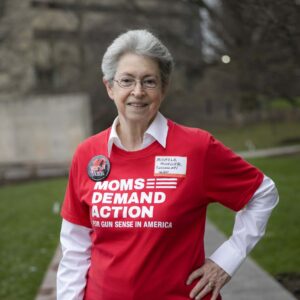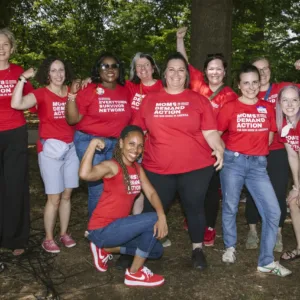As Americans across the country and our leaders are taking action to protect against COVID-19, there are troubling signs that our nation’s gun violence epidemic could escalate as a consequence of the pandemic. During this period of high stress and uncertainty, Americans need to have the facts on the intersection between guns and COVID-19 in order to preserve our resources to fight the virus and keep Americans safe. Some of the most common questions about guns during the COVID-19 pandemic are as follows:
Have gun sales increased as a result of the pandemic?
After social distancing guidelines were announced in response to COVID-19, gun sales surged to the highest levels in history. The five days that followed the announcement are all in the top 10 days for background checks run in a single day, ever. And gun sales remained elevated between March and May; during that time, an estimated 5.9 million guns were sold, an 80 percent increase over the same time last year.
Will background checks block people with dangerous histories from getting guns during the crisis?
Every day, background checks stop gun sales to felons, domestic abusers, and other people who aren’t allowed to have guns under the law—and with Americans purchasing firearms in record numbers, background checks are more important than ever. But federal law allows a gun sale to proceed if the background check takes longer than three days to complete, and a surge in gun sales puts a massive strain on the system. In the March-to-May gun-buying frenzy, at least 91,500 potential “default proceeds” were transferred, including over a thousand transferred to prohibited purchasers.
Do I need a gun to protect myself during the pandemic?
Introducing guns into the home will not make you safer, especially during the stress of a pandemic. Access to a gun in the home doubles the risk of dying by homicide and triples the risk of dying by suicide, risks that may be heightened during a time when people are sheltering in place. And with kids spending far more time at home, a gun stored insecurely in the home can result in tragedy.
How can I store my gun securely?
Responsible gun owners store their guns securely—locked, unloaded, and separate from ammunition. These practices are particularly important during this crisis, as unintentional shooting deaths by children in March, April, and May 2020 increased by 30 percent compared to the average during these months in past years. Secure gun storage practices reduce the risk of accidental injury or death and suicide, especially among youth, while still allowing gun owners quick access to their firearms.
Has there been an increase in gun suicides due to the pandemic?
Both access to a gun and economic stress significantly increases the risk of suicide in adults. Based on the economic crisis caused by the COVID-19 pandemic, Everytown projects that the US could see a 20 to 30 percent increase in firearm suicides, resulting in an additional 5,000 to 7,000 gun suicide deaths in 2020 alone. Other factors, like increased social isolation because of stay-at-home orders and a rise in gun purchases, may only add to this risk.
How is the pandemic affecting domestic violence?
Experts warn that COVID-19 increases the risk of domestic violence as people are sheltering in place with abusers during a stressful and uncertain times. A surge in firearm sales only adds to this risk: access to a gun in a domestic violence situation makes it five times more likely that an abused woman will be killed.
Have stay-at-home orders reduced gun violence in our cities?
Gun violence has not stopped while stay-at-home orders have been in effect, and cities are no exception. In many cities, gun violence persists, even though other types of crime have decreased relative to the same time last year. It is essential that local gun violence prevention and intervention programs—which are effective at reducing firearm deaths and injuries—remain funded as they adapt their strategies to fight both COVID-19 and gun violence.








